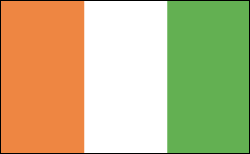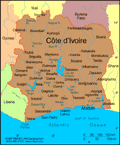Côte d'Ivoire | Facts & Information

- Côte d'Ivoire Profile
- History
- News and Current Events
Facts & Figures
-
President: Alassane Ouattara (2010)
Prime Minister: Daniel Kablan Duncan (2012)
Land area: 122,780 sq mi (318,000 sq km); total area: 124,502 sq mi (322,460 sq km)
Population (2014 est.): 22,848,945 (growth rate: 1.96%); birth rate: 29.25/1000; infant mortality rate: 60.16/1000; life expectancy: 58.01
Capital (2011 est.): Yamoussoukro (official), 966,000; Largest city and administrative center: Abidjan, 4.288 million
Monetary unit: CFA Franc
National name: République de Côte d'lvoire
Languages: French (official) and African languages (Dioula esp.)
Ethnicity/race: Akan 42.1%, Voltaiques (Gur) 17.6%, Northern Mandes 16.5%, Krous 11%, Southern Mandes 10%, other 2.8% (includes 130,000 Lebanese and 14,000 French) (1998)
National Holiday: Independence Day, August 7
Religions: Muslim 38.6%, Christian 32.8%, indigenous 11.9%, none 16.7% (2008 est.) note: the majority of foreigners (migratory workers) are Muslim (70%) and Christian (20%)
Literacy rate: 56.9% (2011 est.)
Economic summary: GDP/PPP (2013 est.): $43.67 billion; per capita $1,800. Real growth rate: 8%. Inflation: 2.9%. Unemployment: n.a.. Arable land: 8.99%. Agriculture: coffee, cocoa beans, bananas, palm kernels, corn, rice, manioc (tapioca), sweet potatoes, sugar, cotton, rubber; timber. Labor force: 7.928 million. Industries: foodstuffs, beverages; wood products, oil refining, truck and bus assembly, textiles, fertilizer, building materials, electricity, ship construction and repair. Natural resources: petroleum, natural gas, diamonds, manganese, iron ore, cobalt, bauxite, copper, hydropower. Exports: $12.96 billion (2013 est.): cocoa, coffee, timber, petroleum, cotton, bananas, pineapples, palm oil, fish. Imports: $9.859 billion (2013 est.): fuel, capital equipment, foodstuffs. Major trading partners: France, Netherlands, U.S., Nigeria, Germany, Canada, China (2012).
Communications: Telephones: main lines in use: 268,000 (2012); mobile cellular: 19.827 million (2011). Broadcast media: 2 state-owned TV stations; no private terrestrial TV stations, but satellite TV subscription service is available; 2 state-owned radio stations; some private radio stations; transmissions of several international broadcasters are available (2007). Internet hosts: 9,115 (2012). Internet users: 967,300 (2009).
Transportation: Railways: total: 660 km (2007). Roadways: total: 81,996 km (2007 est.). Waterways: 980 km (navigable rivers, canals, and numerous coastal lagoons) (2011). Ports and harbors: Abidjan, Aboisso, San-Pedro. Airports: 27 (2013 est.).
International disputes: disputed maritime border between Cote d'Ivoire and Ghana.









